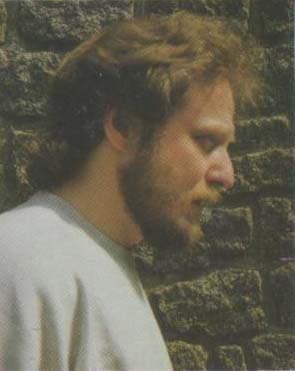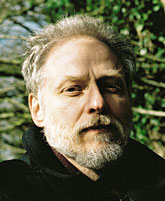| 
A recurring theme in Andreas' work is the existence of parallel worlds,
controlled by higher powers, and leading characters that have access to these worlds.
Rork is the best known example, but it is present also, be it less prominent than in Rork,
in Cromwell Stone. Andreas doesn't give a clear explanation for his preference for this
theme at first. "It must be my mystical side", he mutters. After which he continues
by noticing that he just happens to work with cosmic elements. "It happens almost
automatically. I don't like to make realistic stories. I prefer to make worlds out of my fantasy,
in which impossible things are possible. For reality has its boundaries. I get my
ideas from my subconscious and I commit them to paper. I create for it a background,
that's easier, more direct. Worlds of fantasy are easier to draw than the real world,
for which I should have to document too much. So my choice for this theme has a practical
reason as well, really."
"Readers or fans often think that I'm some kind of a dark figure who knows all about occultism.
I notice that when I meet them at fairs. And this isn't the case at all. I stand with both feet
on the ground. I am not religious, I am a practical and reasonable thinking human being.
It doesn't keep me awake at night, you know this image that they have of me; for that
I do not meet them enough."
The apparent separation that Andreas makes between his personality and his work seems
somewhat forced: he calls himself down to earth, while in his strips he keeps referring to
other entities, world, supernatural powers. Wouldn't there be something of a mutual influence?
Andreas: "Look, part of my personality is reflected in my work, that is my spiritual side,
but that doesn't mean I have live accordingly. It's an interest that is expressed in my stories,
but not in my normal daily life. I don't go to church, I don't look at the stars at night to see if
something is written there."
"I don't believe that the truth is somewhere up there, I believe that the truth is inside us,
it comes from within, not from outside. I don't believe in God, but I don't believe that God
doesn't exist either. I just don't know. I hope there is something, that something happens after
death. But I won't claim that it's like this or like that and that Jezus has preached it. I
also don't have mystical experiences that tell me that there is something supernatural or
extraterrestrial. It's an attractive thought, but it doesn't convince me as a fixed, rational
belief. It does interest me, though. I am, for example, a great fan of tv-series like
Twin Peaks and, more recent, The X-files. A beautiful series. Not so much because of subjects
like werewolves and voodoo, but because of the secretive atmosphere around ufo's and aliens,
and secret agents who once again have to cover up a government experiment."
Andreas likes to play with reality. Events turn out just somewhat different from what
they appear at first sight. Main characters struggle with chimeras, reality is often an illusion.
The reader is disguided regurlarly. He himself calls it an inclination to hold a mirror in front
of the reader in which strange things take place. "It's a projection of my imagination, the same
proces as the creation of different universes. I am more free when I can draw what I think, in
stead of drawing things that I perceive. I draw what I imagine myself; the consequence is that
things deform, I tend to caricature events. I like that. I never go out and copy things. I should,
but I don't. When we were at the academy of art we had to do it, but I didn't, I hated it. I
prefer to sit at home, behind my drawing table and get started with my thoughts. I used to copy
photographs, but I don't do that any more. It's too obvious. Now I look at a photo, put it away,
and make my own interpretation or use a different perspective. Or I put many details in it that
refer to favorite books and tv-programs or people that I admire."
| |

